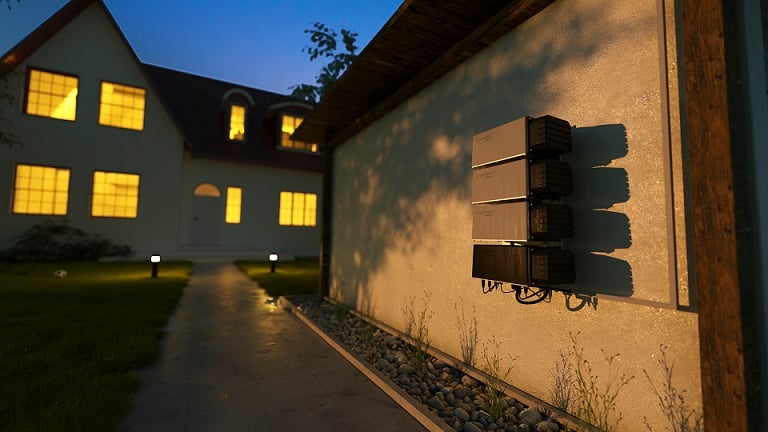
Annual residential battery storage installations in Europe passed the 100,000 mark for the first time ever in 2020, reaching a cumulative total of 3GWh capacity.
The upward trajectory is set to continue and accelerate, according to SolarPower Europe, with a combination of economic and non-economic drivers propelling a 400% growth over five years. The European trade association’s latest annual report into the market forecasts installed residential capacity of 12.8GWh across the continent by 2025.
Enjoy 12 months of exclusive analysis
- Regular insight and analysis of the industry’s biggest developments
- In-depth interviews with the industry’s leading figures
- Annual digital subscription to the PV Tech Power journal
- Discounts on Solar Media’s portfolio of events, in-person and virtual
Uptake in Germany, Europe’s biggest national market for household batteries, was initially spurred on by environmental concerns and a desire for more energy independence. Yet the economics have also now become favourable: German households with solar and storage systems have a levelised cost of electricity of nearly a third less than those without, at €0.122 (US$0.137)/kWh.
Around 60% of new solar PV systems in Germany are being installed together with battery storage. High retail power prices are a direct driver in this uptake.
In 2020, around 140,000 systems with more than 1GWh combined capacity were installed in Europe. Not only was that the first time there were more than 100,000 installs in a year, it was also the first time the gigawatt-hour threshold was surpassed.
“As the popularity of residential solar increases, more households are realising that domestic storage systems will maximise the value of their solar PV systems,” SolarPower Europe CEO Walburga Hemetsberger said.
“While Europe is increasingly affected by gas-related energy price shocks, solar and storage is the clear answer to volatile energy prices.”
For 2021, SolarPower Europe is forecasting more of the same, with the cumulative capacity to reach 4.4GWh.
Perhaps less positive was the fact that market interest remains largely concentrated in a few countries. Germany, Italy, the UK, Austria and Switzerland together accounted for a 93% market share and Germany alone for 70% of the 2020 total. SolarPower Europe said that at present, this is likely to remain unchanged and even by 2025 those same five countries are likely to hold an 88% share.
More attention needs to be paid to ‘immense potential’
Policymakers need to focus a lot more of their attention on enabling the deployment of batteries as a complementary technology to solar, the group argued.
In order to meet the Paris Agreement’s climate goals and have a chance of limiting global warming to 1.5°C, SolarPower Europe said solar deployment targets in 2030 National Energy Climate Plans (NECPs) have to be more than doubled. Battery storage has gigantic potential to enable the integration of that clean energy source.
“Combining solar & storage is key to achieving a climate-neutral EU by 2050. Not only will it enable the EU to increase the share of renewables, but importantly, solar & storage will supply reliable, clean and cost-effective energy to homes and businesses during peak times,” SolarPower Europe’s Walburga Hemetsberger said.
“National policymakers must recognise this immense potential and significantly feature distributed storage in the revision of their National Energy and Climate Plans.”
Implementation of the European Union’s Clean Energy Package has also been far too slow, the trade association argued. The Clean Energy Package includes guidelines to creating regulations to enable prosumer and self-consumption business models — i.e. allowing homeowners to consume their own solar-generated energy or sell it to each other rather than sending it back to the grid — but only a few EU member states have so far adopted it into their national legislation.
Some existing policy frameworks around Europe are actively delaying battery storage uptake, such as net metering policies in the Netherlands, the group said. Ways to leverage batteries to play a bigger role in the electricity system, such as virtual power plants (VPPs) should also be supported.
As Germany has shown, subsidy schemes are not needed anymore in mature markets where economic drivers are strong, but in other markets, some support schemes to kick start market interest could be desirable, according to the report.
“The EU Clean Energy Package offers Member States clear solutions to facilitate a Europe-wide BESS rollout. If we want to see the residential battery market develop beyond the first few key countries, and help protect citizens from rising energy prices, more European governments need to move faster to fully implement the Clean Energy Package,” SolarPower Europe’s head of market intelligence, Michael Schmela, said.
Supportive regulatory and policy frameworks that allow the potential benefits of residential batteries to be realised could drive cumulative installs by 2025 to an upper forecast of 14.6GWh. Although even in the most pessimistic scenario modelled by the trade group the market will grow, in that case 2025 installs would only reach 10.2GWh.
The value of the industry to Europe — both economically as well as environmentally — also needs to be captured through things like a “future-proof EU Battery Regulation,” SolarPower Europe’s senior policy analyst Raffaele Rossi said.
This would support the competitiveness of “strategic industrial sectors,” while avoiding overburdening manufacturers or dissuading investors, Rossi said.
“It is crucial to establish sustainability and quality frameworks for battery requirements – but any framework must avoid distortive effects on markets.”
The SolarPower Europe annual ‘European market outlook for residential battery storage 2021-2025’ can be downloaded from the group’s website, here.
Earlier this year, fellow trade association European Association for Storage of Energy (EASE) found that by the end of 2020, cumulative installs across all market segments in Europe reached 5.26GWh, implying that residential storage constitutes a big slice of the continent’s overall market.






